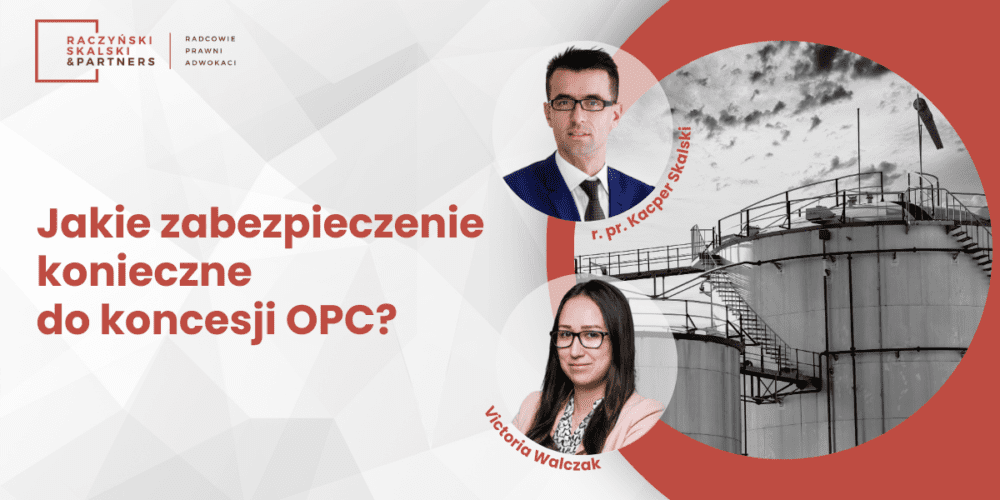Wanting to engage in the business of trading in liquid fuels, an entrepreneur should have an appropriate license – in this case, it will be an OPC license (liquid fuels trading license), which is issued by the President of the Energy Regulatory Office (President of the ERO).
In order to obtain a concession (not just a liquid fuels trading concession), one must, among other things, have adequate funds or have a proven ability to obtain such funds. If an entrepreneur does not have adequate funds to carry out his licensed activities, he will not receive a positive decision on granting an OPC license. However, in the event that the funds possessed by the applicant to carry out the activity are not sufficient and do not guarantee the security of third-party claims, in particular, an OPC license may be issued as long as adequate property security is submitted to the regulator by the applicant (Concessions in the Energy Law – Scope of State Dominion, Dr. Zdzislaw Muras).
According to the information package for the concession consisting of trading in liquid fuels published by the President of the ERO November, 2023 (OPC concession), one of the conditions for obtaining an OPC concession is the establishment of adequate collateral, which is also stipulated in Article 38(2) of the Energy Law of April 10, 1997 (Journal of Laws 2024.266, dated 2024.02.28) , thus:
– The property collateral shall be established in the amount of no less than 1/12 of the highest annual revenues from the licensed business activity planned for the next 3 calendar years.
The security should be established for a period of not less than 12 months of performance of the activity covered by the application for a license, provided that it will be renewed (Article 38 paragraph 4 of the Energy Law), and should be submitted in the form of a bank or insurance guarantee (Article 38 paragraph 6 of the Energy Law).
The guarantee consists of a written undertaking by the guarantor to pay claims unconditionally and irrevocably, whenever called upon by third parties, with the guarantor and the entrepreneur who performs activities under the liquid fuels trading license being jointly and severally liable (Article 38(7) of the Energy Law).
Moreover, the obligation to provide a property security may be imposed by the President of the Energy Regulatory Authority even before the relevant license is issued. The collateral itself is defined as an obligation imposed by the regulator, in the form of a closed catalog as:
- insurance guarantee,
- bank guarantee,
Although the above-mentioned forms are explicitly specified, the final decision rests with the regulator. Collateral may also be proposed in another form by the applicant, and the regulator may grant the request. Importantly, the security should be presented in writing (M. Czarnecka, T. Ogórek, Energy Law. Energy Efficiency, Volume I, Issue 2, Commentary to Article 38).
It is worth pointing out that, in the opinion of the President of the ERO, “a promise of a loan from an individual is not a sufficient document confirming the possibility of obtaining funds allowing for the possible satisfaction of third-party claims that may arise as a result of improper conduct of licensed activities or damage to the environment” (Judgment of the SA in Warsaw of November 19, 2009, VI ACa 527/09).
However, let’s go back to the provision of Article 38(1) of the Energy Law and the passage “The granting of a license may be made conditional on the applicant providing property security.” This means that property collateral may or may not be presented. The regulator itself is also unlikely to admonish the entrepreneur about the need to submit, for example, a bank guarantee – “This provision does not impose an obligation on the authority to demand collateral, but leaves it relatively wide discretion in this regard. Property collateral (…) may constitute a conditional premise for granting a license” (Judgment of the District Court – SOKiK, March 21, 2018 XVII AmE 113/15). How, then, should an applicant read these provisions? Rather, as a good custom, or as a safeguard of its interests.
On the other hand, what should such a security look like? What should the amount be? Here again, apart from the 1/12th of the highest revenue planning (Article 38(1) of the Energy Law) and a bank or insurance guarantee (Article 38(6) of the Energy Law) mentioned in the regulations, there is little guidance. Hardly, the choice of asset collateral, or rather, checking whether it has been “chosen” well, is subject only to the discretion of the authority. This is its administrative discretion, since, according to the law, the regulator is entitled to “choose the settlement, and therefore occurs when the legal norm does not provide for the obligation of a certain behavior of the authority, but the possibility of choosing to settle the case.” (Judgment of the District Court – SOKiK, dated March 28, 2023, XVII AmE 156/21).
What does this basically mean for applicants? Unfortunately, it means that the courts are leaving the ERO President in a kind of latitude, because “The courts have neither comprehensive knowledge of the market situation, nor the administrative apparatus to gather and analyze it (…). Nor should the courts shape state policy, including energy policy (…). In spheres where the President of the Office has discretion and exercises it in a manner consistent with the State’s energy policy, the Court, by substituting its activity, would go beyond the framework in which it can move in accordance with the principle of the tripartite division of power.” (Judgment of the Court of Appeals in Warsaw, November 15, 2017, VII ACa 902/71).
Interestingly, the President of the ERO does not explicitly specify the amount the entity should have, moreover, it gives it to the applicant to evaluate by estimating the planned activities and turnover (Judgment of the District Court – SOKiK, dated August 30, 2018, XVII AmE 86/16).
When will the obligation to provide collateral occur?
Since the ERO President will not admonish, it is left to the applicant to provide collateral. It should be remembered that in case of doubt, or when the entrepreneur himself notices that he does not have sufficient funds or the ability to obtain them, this is a sufficient reason to provide collateral for assets – that is, funds that guarantee the proper performance of the licensed activity (Judgment of the District Court – SOKiK, dated March 28, 2022, XVII AmE 156/21).
Measures that will guarantee the proper performance of the licensed business are not only collateral for receivables in connection with the purchase of goods for resale, but also measures that will pay off claims such as:
- possible damages related to the risk of conducting licensed business,
- Social Security claims;
- and other charges such as concession fees.
– (Judgment of the District Court – SOKiK, dated August 30, 2018 XVII AmE 86/16).
What kind of financial resources can these be then?
First of all, equity or foreign capital, and it is important to ensure that the capital is not negative, as the ERO President will assess this as a negative situation for the company, i.e. balance sheet bankruptcy. As a company that is unable to cover long-term and short-term liabilities. The result? A negative decision by the ERO President refusing to grant licenses.
The next, is – an external source of financing and other means to present the proper performance of the licensed activity by the entity. So, entrepreneur, just remember that the ERO President will not tell you how much funds you should have, what amount ensures the proper performance of the activity, or in what amount the guarantee should be submitted, since “The provision of Article 33.1.2 p.e. does not indicate the level of funds that the licensee would have to achieve or was able to achieve, so you cannot expect the authority to set such a level.” (Judgment of the District Court – Court of Competition and Consumer Protection of June 8, 2022, XVII AmE 100/21).
Better more than less:
This is how the value of the collateral should be determined on the license application. Since the collateral is calculated on the basis of 1/12 of the largest planned revenues it is most important that the applicant should not think of underestimating revenues, because the energy world knows cases when underestimating revenues and thus lower collateral, ended in a negative decision by the President of the ERO, and here even an appeal will not help (M. Czarnecka, T. Ogórek, Energy Law. Energy Efficiency, Volume I, Issue 2, Commentary to Article 38).
Why won’t an appeal help? Because, as mentioned above, if the courts give the regulator leeway, and since they consider the regulator to have the best knowledge of the market situation, they will not step in.
It is also worth noting that in concession decisions, in the “Reporting and providing information” section, there appears an obligation to inform the ERO President of a significant exceedance (above 50%) of the revenue threshold indicated in the Business Plan attached to the application for a concession. Information on such an excess must be submitted by the end of the first quarter of the year following the year in which the excess occurred.
Such a significant excess may result in a re-examination of the concessionaire’s financial condition by the ERO President, which may consequently lead to a decision to increase the asset security.
Summary:
Entrepreneur applying for a liquid fuel trading license, remember to:
submit reliable and realistic financial projections matching your capital and capabilities to the ERO President;
Do not apply for a license without having adequate funds in your enterprise;
In case of lack of funds in the enterprise – secure with external funds.
Our assistance:
We have extensive experience in successfully obtaining licenses from the President of the ERO, including licenses for fuel trading (OPC license). We invite you to take advantage of our services – we will help you go through the entire process smoothly.
If you need help, write to us!
or via the form available at the link below: Contact form



